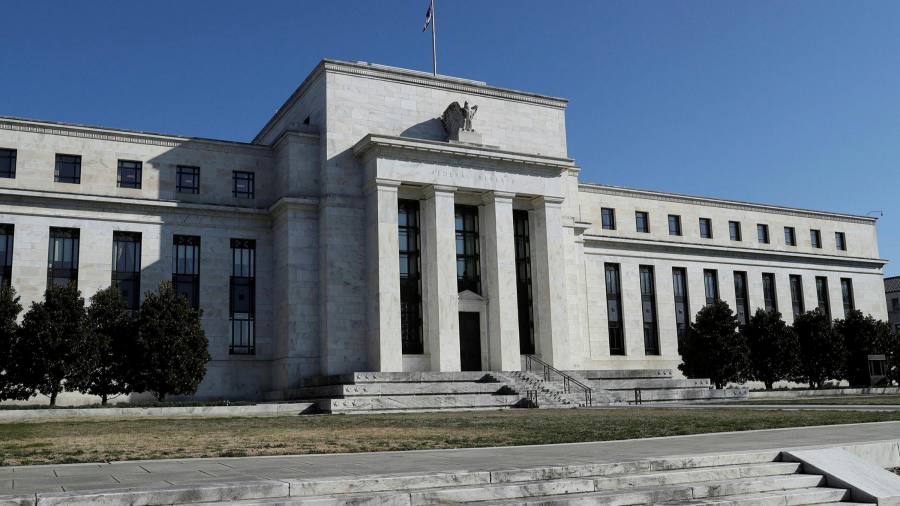[ad_1]
US banks are pressing the Federal Reserve to extend concessions that loosened capital requirements when the pandemic struck, arguing that financial markets would be at risk if the relief expires as planned next month.
US regulators — including the Federal Deposit Insurance Corporation and the Office of the Comptroller of the Currency, as well as the Fed — eased the so-called supplementary leverage ratio (SLR) last April, as the pandemic shuttered the economy and convulsed the government bond market.
Balance sheet constraints may have hamstrung banks and prevented them from forcefully stepping in to stabilise whipsawing markets, according to the Financial Stability Board’s report on the disruptions to trading in US Treasuries and other securities last March.
The SLR requires large banks to have capital equal to at least 3 per cent of their assets, or 5 per cent for the largest, systemically important institutions. Under the reprieve, lenders were allowed to temporarily exclude holdings of US Treasuries and cash kept in reserve at the central bank from their assets when calculating the ratio.
People familiar with the situation told the Financial Times that banks and industry representatives had been in talks with the Fed to extend the exemption beyond March. One said a reprieve looked likely, while others said there was little clarity.
The arguments have centred on the fact that many of the unusual conditions that originally prompted the easing are still in place, including the Fed’s massive intervention in the Treasury market. Some bankers have also warned of potentially grave consequences for the market.
“If you force the banks to hold more capital by not adjusting SLR, guess what? It will make markets choppier. It will make the Treasury market less liquid, and it will make funding markets more problematic,†said Mark Cabana, a rates strategist at Bank of America.
The change made it easier for banks to absorb the extra cash the Fed was pumping into financial markets; facilitate trading in US Treasuries; take in extra deposits from customers who cut spending during the lockdown; and extend credit to companies facing a cash crunch.
Jenn Piepszak, chief financial officer at JPMorgan Chase, said in January that the bank was considering how it might react if the SLR relief was cut off in March. “We could simply shy away from taking new deposits, redirecting them elsewhere in the system,†she said, “or we can issue or retain additional capital and pass on some of their costs, which is certainly something we wouldn’t want to do in this environment.â€
JPMorgan had the lowest SLR of America’s big banks at the end of 2020, at 6.9 per cent. Without the concession, it told investors the ratio would have been 5.8 per cent. That is above the 5 per cent ratio, but banks tend to want a cushion over minimum regulatory requirements.
Brian Moynihan, Bank of America chief executive, recently struck a more sanguine tone, telling investors that various regulatory concessions granted last year, including the SLR, turned out to be things “we didn’t need†to use. BofA reported an SLR of 7.2 per cent at the end of 2020, which would have been 6.2 per cent without the relief.Â
Citigroup’s treasurer Mike Verdeschi told fixed income investors in January that eliminating the SLR relief would not have an impact on his bank’s plan to return capital to shareholders and that Citi would still have “opportunity to continue to growâ€.
All the same, he argued that extending the relief would “very much make sense†since the $3.2tn extension of the Fed’s balance sheet in 2020 left the banking system with $2.8tn of extra deposits, which has “implications for leverageâ€. Deposits must be used to buy assets, and without the exemption, all assets count towards the leverage ratio.
The Fed declined to comment on any deliberations with banks but, in October, vice-chair for supervision Randal Quarles said the SLR change was “temporary†and there was no current discussion around “making it other than temporaryâ€.
“The longer that there is uncertainty about the SLR extension the more damaging it could be for markets, especially if the decision is to not extend it,†said Gennadiy Goldberg, a rates strategist at TD Securities. “The last thing regulators want to do is to spring surprise tightening on to the people they are regulating.â€
The FDIC and OCC also declined to comment.
Additional reporting by James Politi
[ad_2]
Source link





